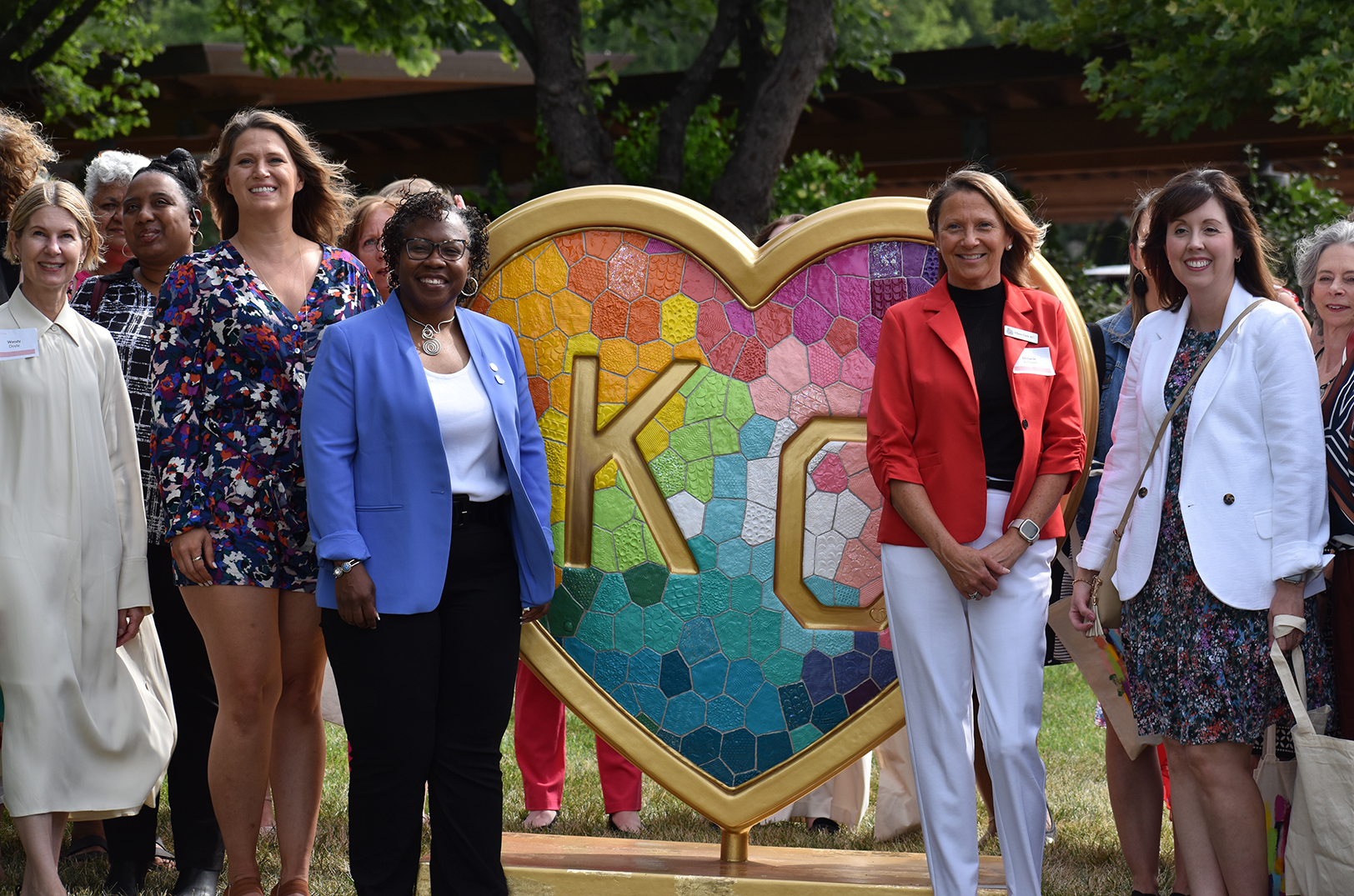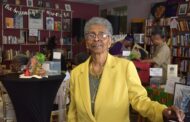Wendy Doyle’s mother — herself an entrepreneur — instilled in her daughter a belief that women have a responsibility to boost their sisters in the world of business, the United WE leader said.
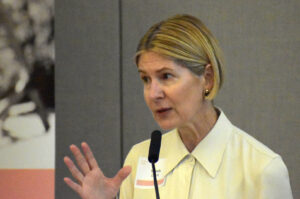
Wendy Doyle, United WE, speaks during the “Takes Heart: A Celebration of Women Entrepreneurs” event at the Ewing Marion Kauffman Foundation; photo by Taylor Wilmore, Startland News
“I watched her support other women owned businesses, women in need, and encourage women to run for elected office and even help on their campaigns,” Doyle told a crowd gathered Tuesday for the “Takes Heart: A Celebration of Women Entrepreneurs” event. “Her mission to lift up other women is something she modeled for me and for other women in the community.”
The United WE (Women’s Empowerment) — for which Doyle serves as president and CEO and spearheads local efforts to advance all women’s economic and civic leadership — recently released new details from its National Commission on Childcare and Women’s Entrepreneurship report. The initiative was funded by a grant from the Ewing Marion Kauffman Foundation.
“I come from a line of women entrepreneurs,” noted Doyle, whose grandmother started her own accounting business in 1939. “It’s not an easy path. It takes courage, dedication, and of course, it takes heart.”
“Women’s entrepreneurship has continued to grow exponentially and thrive in new ways,” she added. “But some of the same barriers to success that existed decades ago remain, leaving economic growth and opportunity behind.”
Additional creative and social entrepreneurs detailed their experiences of juggling life with their businesses and how they are empowering other women at Tuesday’s event.
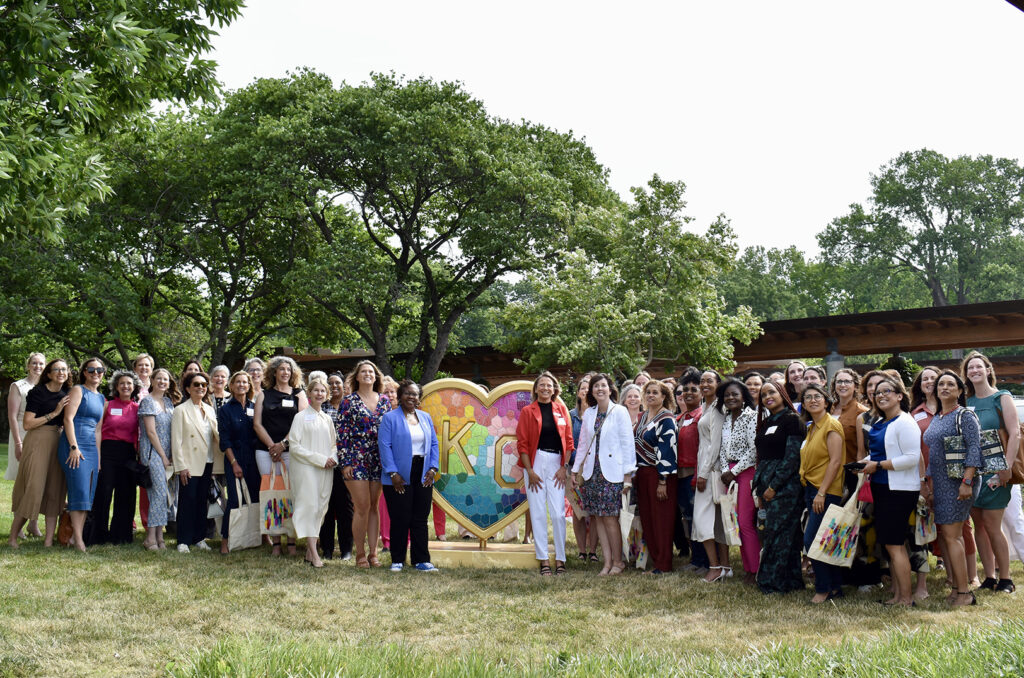
“Takes Heart: A Celebration of Women Entrepreneurs” event attendees gather around the “Takes Heart” Parade of Hearts entry on the Kauffman Foundation campus; photo courtesy of United WE

Artist Laura Crossley’s “Takes Heart” Parade of Hearts entry on the Kauffman Foundation campus; photo by Taylor Wilmore, Startland News
Among them: Laura Crossley, the Takes Heart founder who designed a Parade of Hearts entry by the same name that celebrates the courage, creativity, and tenacity of Kansas City’s women+ entrepreneurs and women-owned businesses.
Her heart can be found in front of the Kauffman Foundation’s campus on Rockhill Road. The piece includes interactive tiles that when scanned by a smartphone reveal inspiring stories, women-owned businesses, and entrepreneurial resources across the city.
“As entrepreneurs and leaders in our organizations, we all have a responsibility to ensure that the women in our organizations can thrive,” Crossley said, “whether they are an employee of ours or they are a colleague, a team member, they are a vendor, they are someone we are working with in the community or they’re another entrepreneur next door.”
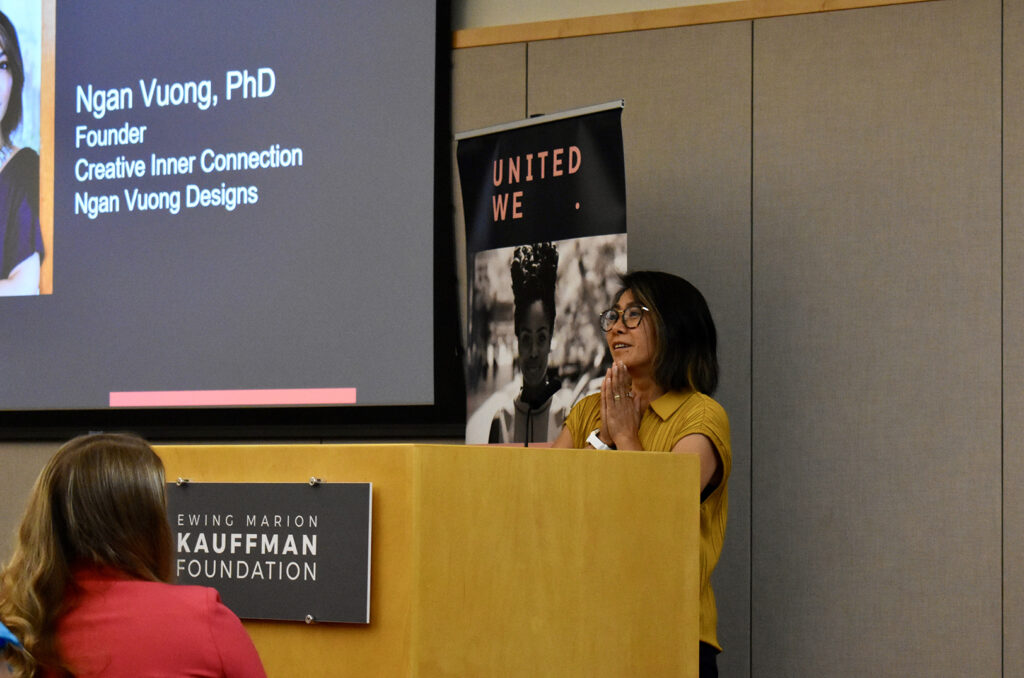
Dr. Ngan Vuong shares her journey during the “Takes Heart: A Celebration of Women Entrepreneurs” event at the Ewing Marion Kauffman Foundation; photo courtesy of United WE
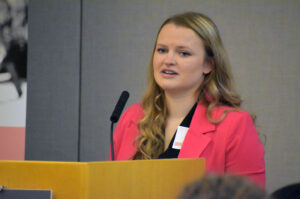
Allie Lohman, All for Moms Foundation, speaks during the “Takes Heart: A Celebration of Women Entrepreneurs” event at the Ewing Marion Kauffman Foundation; photo by Taylor Wilmore, Startland News
Dr. Ngan Vuong — a licensed clinical psychologist and metalsmith — described how her jewelry-making business saved her during a dark period of her life. She now aims to empower other women through her line of accessories.
“I create jewelry for the modern warrior,” Vuong noted. “There are elements of grittiness and rawness to my work, I want to remind women of their inner warrior.”
Allie Lohman — co-founder of the All for Moms Foundation — shared how her organization works to improve mental health through home transformations for moms and families living in clutter and chaos. The transformations are completed entirely by teams of women volunteers.
“If that isn’t the biggest testimony that the village is real, then I don’t know what it is,” Lohman said. “The village is me. The village is you. It’s in each one of us. We just have to show up for one another.”
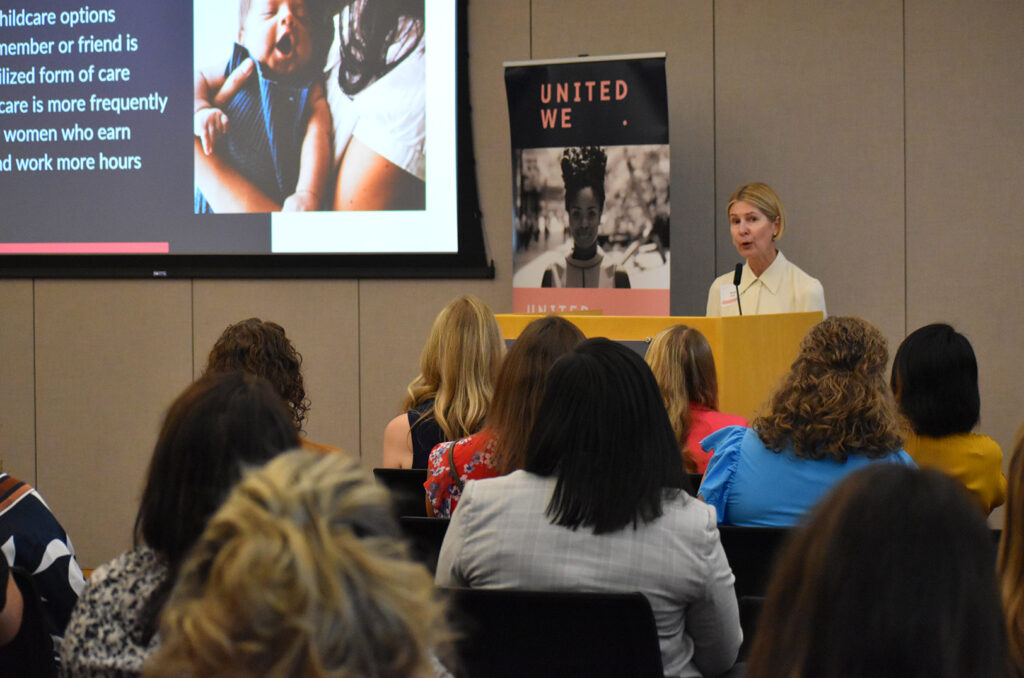
Wendy Doyle, United WE, speaks during the “Takes Heart: A Celebration of Women Entrepreneurs” event at the Ewing Marion Kauffman Foundation; photo courtesy of United WE
How child care impacts economic mobility
Doyle continues her mother’s legacy of supporting women today through her work with United WE, she said.
In recent years, she noted, the organization’s research and policy have been focused in the areas of entrepreneurship, child care, paid family leave, occupational licensing, pay equity, and civic engagement.
“Through years of qualitative and quantitative research and recent focus groups with women entrepreneurs — including some people in the room — not surprising, an issue that kept bubbling up as a barrier to economic opportunity was the lack of access to quality childcare,” she continued.
This led to the National Commission on Childcare and Women’s Entrepreneurship, Doyle noted, to generate awareness and new policy ideas to reduce the barriers of childcare that limit women’s entrepreneurship. The commission consists of women-owned childcare providers, industry experts, and mothers who are entrepreneurs from multiple states.
“Childcare in the United States is often both difficult to find and prohibitively expensive,” she explained. “If our childcare system fails to meet the needs of women entrepreneurs, we risk stifling innovation and economic development. Simply put, childcare is a business imperative and should be treated as such.”
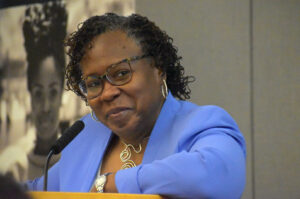
Dr. DeAngela Burns-Wallace, Ewing Marion Kauffman Foundation, explains the foundation’s connection to child care advocacy during the “Takes Heart: A Celebration of Women Entrepreneurs” event at the Ewing Marion Kauffman Foundation; photo by Taylor Wilmore, Startland News
The Kauffman Foundation funded this important research, said Dr. DeAngela Burns-Wallace, president and CEO of the foundation, because its leaders know that women-owned businesses are critical to local communities and their economies.
“Again, understanding systemic barriers that impede our entrepreneurs from being able to do the amazing work that they do is part of our mission,” she added.
RELATED: Kauffman CEO: Foundation’s reset aligns Mr. K’s intent with KC’s needs of the moment
The United WE also on Tuesday released the commission’s statement of principles to guide its mission, which included the following key recommendations:
- accommodate supply-side (like operational grants and targeted tax credits for teachers and program operators) and demand-side (like vouchers for families) public support.
- compensate the childcare workforce sufficiently so that early educators flourish and the quality of childcare programs improves.
- include robust, real-time data on childcare supply and demand so that policymakers can accurately plan for, and fund, services for the age groups and locations where gaps are most significant, and families can easily identify available spaces, reserve, and enroll in childcare sites online.
Click here to read the commission’s full statement of principles.




